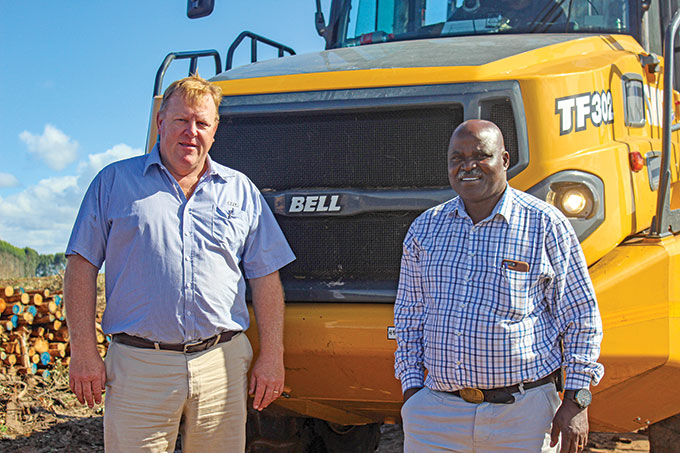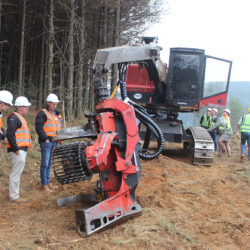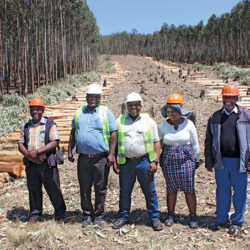Bell Equipment Sales Representative, Haig Thompson, with Joseph Zulu from Siyawisa Hlathi in front of the TH302E timber truck.
An enterprising spirit, enduring perseverance and an ability to change with the times have seen an emerging timber harvesting contractor in northern KwaZulu-Natal evolve from a motor manual outfit into a successful, fully mechanised harvesting operation.
Joseph Zulu started his company Siyawisa Hlathi, meaning ‘we fell timber’, in 2005. He has since used his years of forestry experience and his confidence in Bell Equipment to embrace mechanisation, becoming a leading contractor in the process.
Siyawisa was the first to take delivery of the new Waratah H215E processing head and more recently took delivery of the first 6×6 and 4×4 Bell E-series forwarders to roll off the production line.
Joseph started his career in forestry as a supervisor for Ntonjaneni Timber Harvesters (NTH) in Melmoth, having previously worked in the agricultural sector. After seven years with NTH the company closed down and Joseph moved to Fell & Haul where he worked as a foreman on the harvesting operation. Eight years later Fell & Haul was bought by Unitrans prompting Joseph to start Siyawisa Hlathi, which subcontracted to Unitrans for three years. This was a motor manual operation using chainsaws for felling and manual labour for debarking and stacking.
A turning point came in 2005 when Siyawisa Hlathi was awarded a three-year contract with SiyaQhubeka Forests (SQF), a partnership between Mondi Forests, black empowerment partners, government and the local community surrounding the iSimangaliso Wetland Park. Another contract followed and then SQF decided to introduce a semi-mechanised harvesting system to support the requirement for a safer operating environment, higher production and opportunities to upskill labour.
The start of a productive relationship
Knowing and understanding the requirements, Joseph turned to Bell Equipment having had positive experiences with the company and its equipment during his years as a foreman on the Eastern Shores, where he used a T25 Timber Truck and a Bell Flexi Loader, as well as at Fell & Haul. “Bell machines have performed well, so I have always loved working with them,” he says.
Joseph started by purchasing two Bell excavators fitted with Waratah heads and one Bell forwarder. However, in 2011 when he was awarded a contract in the Dukuduku and Nyalazi areas, his operation went fully mechanised and he added three excavator-based harvesters fitted with Waratah HTH616C heads and another Bell forwarder to his fleet.
Today Siyawisa Hlathi employs 16 operators and works 24 hours, seven days a week in Dukuduku and Kwambonambi. Combined these operations harvest 12 700t of Eucalyptus per month, crosscut into 5,5m lengths and delivered to roadside where it is loaded into long haul trucks.
To achieve Mondi Forests’ objective of debarking in a single pass, Siyawisa Hlathi recently invested in three Waratah H215E heads fitted to Kobelco SK210LC excavators. The single pass has delivered benefits of increased production, lower costs and a reduction in fibre damage. The reduction in fibre damage is achieved by reducing the number of passes of the head along the stem thanks to specialised rollers and the combined action of the de-limbing knives and the head’s inner chassis.
The company has also bought a fourth Kobelco SK210LC with a Matriarch MF800 0,8m² grapple for loading road trucks.
Solid service from Bell Empangeni has kept Joseph loyal to the brand.
“I enjoy working with the Campbells and get good service from Bell Empangeni. Companies all have the same problem that stock is kept in Johannesburg but with Bell if I order today, I will have what I need by tomorrow. They appreciate that time is money in this business and always try their best.”
Proper servicing leads to longevity
Joseph believes it is a mistake to chase production and skimp on servicing. “If a machine needs servicing then we stop the machine because if you look after your machines, they will look after you,” he says. For this reason, Bell carries out major servicing of Siyawisa Hlathi’s equipment, Bell Customer Care provides Machine Condition Assessments (MCAs) while Siyawisa Hlathi is responsible for greasing and minor services.
The proof of this approach can be seen with Joseph’s two oldest Bell forwarders, which have achieved 33 000 and 24 000 hours respectively. “The oldest machine has done very well. I’ve had to replace the diff after it ran out of oil but there have been no major breakdowns,” says Joseph. “The second one has had two new gearboxes but the engine is still going strong. The original set of tyres reached 12 000 hours because of the sandy underfoot conditions and there is still one of those tyres on the machine!”
Just as impressive are the 28 000, 24 000 and 22 000 hours achieved on his Waratah HTH616C processing heads. These units have been so meticulously maintained that Joseph plans to change the rollers so that they can enjoy a second life.
He is expecting much of the same from his Waratah H215Es in terms of longevity with the oldest unit having already reached 4 000 hours. The H215E’s easier greasing system has impressed Joseph.
The Kobelco SK210LC is a true complement to the Waratah H215E, using between 20 to 25% less fuel and delivering better productivity than the competitor carriers that Joseph bought in between his Kato and Kobelco machines. This is largely due to the improved hydraulic routing on the excavator, creating less friction on the hydraulics, which means less power is needed to drive the hydraulics and the machine operates at lower revs, resulting in lower fuel burn. The reduced revs also translate to a quieter operating environment.
Siyawisa Hlathi is achieving 18-ton payloads with the new 6×6 Bell forwarder.
Timber forwarders
Bell Equipment’s first E-series six-wheel drive Bell TH302 timber forwarder was delivered to Siyawisa Hlathi in May and Joseph has been impressed with the improvements vs his older machines. “We don’t need 6×6 often but we decided on this forwarder because there are some areas where additional traction is needed. Safety is very important so I like that the crane has been designed for it to be controlled and set electronically from the operator’s cab. Apart from the safety aspect it means that the turnaround time is faster and it is easier to diagnose and set the pressures,” says Joseph.
A further safety aspect on the Bell forwarder is the braking capability, which complies with the European Braking Standard, one of the most rigorous in the world.
The company is achieving 18t payloads with the new 6×6 forwarder compared to the 13t payload of his older units. A new 4×4 forwarder was added to the fleet in July and, with the slighter wider bunks on the E-series model, Joseph says that the truck is delivering payloads in the region of 15t.
Bell Equipment Sales Representative, Haig Thompson, is justifiably proud of his customer. “Joseph has been a fantastic story for us because he has remained true to Bell and achieved his production, so much so that the landowner is encouraging contractors to follow suit and come to Bell.”




